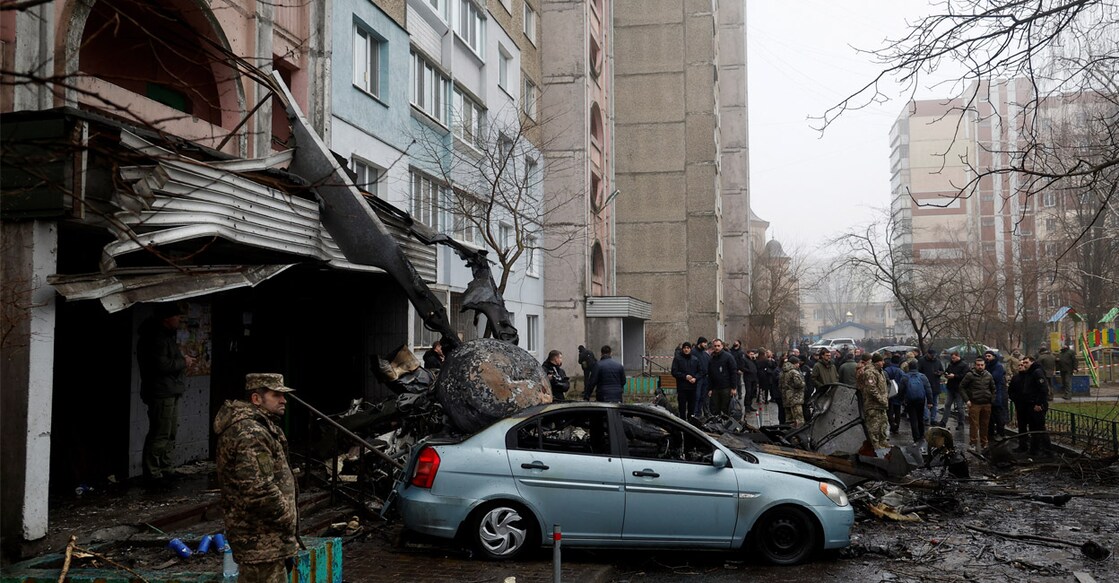Tharoor Line | Mounting military losses point to Russia's costly Ukraine misadventure

Mail This Article
As Russia’s war in Ukraine nears its first anniversary a week away, what had appeared to most of us to be showing all the signs of a prolonged stalemate now appears to be tilting in favour of the Ukrainians. Some 350 days into the conflict, the signs are apparent that the Russians are increasingly getting the worst of their costly misadventure.
To begin with, Russian military losses have been mounting. To stanch the haemorrhage of their soldiers’ blood, the government had made an effort to outsource part of the war to the Wagner Group, a semi-private force of mercenaries and convicts who had served as enforcers of some of the more dubious aspects of Russian foreign policy in the past. This does not seem to be working out as planned, with huge casualties in the recent engagement at Bakhmut in the Donbas leading some observers to call it their Waterloo. Now it seems that Russia’s general mobilisation of 3,00,000 conscripted soldiers that had been announced in September might be enhanced to half a million, immersing the country even more deeply into the Ukrainian quagmire, which is likely to increase the unpopularity of “Putin’s war” among the general populace.
If Russia had hoped that the rigours of the European winter might lead to a weakening of resolve on the part of the European Union countries, there are no signs of it. The latest news is that the EU has pledged to double a military aid programme for Ukraine by training an extra 15,000 soldiers. The Germans have agreed to despatch their famous Leopard tanks and a state-of-the-art SAMP/T air defence system to protect against missiles is being provided by Italy and France. These are expected to be functional in Ukraine within the next two months, while Poland’s Prime Minister has declared his country’s willingness to supply Ukraine with F-16 fighter jets if the decision to do so were taken together with NATO allies.
Meanwhile, speaking in Kyiv, the European Commission president, Ursula von der Leyen, reiterated that that the EU will “stand by Ukraine for the long haul” and that the EU aimed to have a 10th package of sanctions against Russia in place by February 24, the first anniversary of the war. However, it is true that the Russians have developed effective “work-arounds”, or techniques to bypass the sanctions, so that the risk that sanctions would bite severely enough to trigger an over-reaction seem extremely unlikely. Malayali travellers from Moscow over the Christmas/New Year holidays assured me that the impact of sanctions is barely felt in their everyday lives.

But other developments do not bode so well for Russia. The European parliament has voted to approve a “roadmap” for Ukraine’s accession to the EU. And talk of Ukraine being admitted to NATO after all is gaining ground, after the redoubtable Henry Kissinger surprised many at Davos by changing his stance on the issue and supporting Ukraine’s entry into NATO. EU leaders have also announced that they are setting up an international criminal court in the Hague to try those accused of war crimes in the ongoing conflict – just in case some in Moscow thought that one day a peace would be possible in which “forgive and forget” would prevail. It won’t.
Indeed, the change in the veteran strategist Kissinger’s position is a pointer to the way the odds are shifting against Russia. Kissinger, who at one point early in the war had suggested that negotiating on terms acceptable to the Russians was the best way out of the quagmire, has now modified his stance, urging a toughening of support for Ukraine. For instance, the flexibility he had earlier urged in conceding to Russia some territory on the eastern front, and in effect asking Kyiv to negotiate new borders, has given way to a less flexible endorsement of Ukraine’s stand. Support for a negotiated peace looks even more elusive today than at any time since the start of the war.

As the war’s anniversary approaches and both sides plan spectacular events to mark February 24th, might things spiral out of control? The worry emanates from Russia’s own rhetoric, as President Putin ominously threatened in a recent speech that Russia’s armed response to Western assistance for Ukraine would not necessarily be confined to armoured vehicles. Was his remark -- that “those who expect to win on the battlefield apparently do not understand that a modern war with Russia will be utterly different for them” -- an allusion to Russia’s nuclear arsenal? Or was he merely hinting at the widely-rumoured major new offensive that his government is reportedly planning to mark the anniversary of the war? Whatever it is, such prospects of escalation do not bode well for the rest of the world, reeling from the side-effects of the conflict. An open-ended stalemate might even be preferable to the likelihood of things spinning out of control unexpectedly in the direction of an unthinkable nuclear Armageddon.
Pakistan seeks IMF bailout
The other international story to keep an eye on is the IMF bailout for Pakistan’s economy, which was near collapse, with barely any foreign exchange reserves to cover imports, and high inflation, especially of fuel and commodity prices, driving a sense of national crisis. After coming to power in a constitutional cup that unseated the populist Imran Khan, the Shahbaz Sharif government finds itself saddled with the burden that would otherwise have been his – that of taking the tough austerity measures demanded by the IMF, including currency devaluation, higher power tariffs, reduced subsidies and increased taxes, which will inevitably prove hugely unpopular. But if it doesn’t bite the bullet, Pakistan cannot pay for imports, industries will shut down (as Toyota and Suzuki already have) and angry, hungry, unemployed people will come out onto the streets.
This is all happening when the beleaguered Sharif government already faces terrorist attacks by the Tehreek-e-Taliban Pakistan, restiveness on its Afghan border, and mounting instability as Imran Khan multiplies his agitations calling for early elections. No wonder Pakistan has gone to the IMF for a financial package for the 24th time. Despite Islamabad’s protracted resistance to some of the IMF’s conditions, an agreement looks inevitable, since it is a matter of survival for the Pakistan government. Nor is it likely that Islamabad’s usual friends – Saudi Arabia, China and the US – will allow it to go under completely. Not even India wants a failed state on its borders. So Pakistan will survive again, and the most likely consequence is that the public will vent their frustrations when next given a chance, and bring Imran back. The other possibility, of a military takeover, is always there, given the country’s tortured history. But not even the Army is dumb enough to want to take the responsibility of the unholy mess that governing Pakistan has become.


